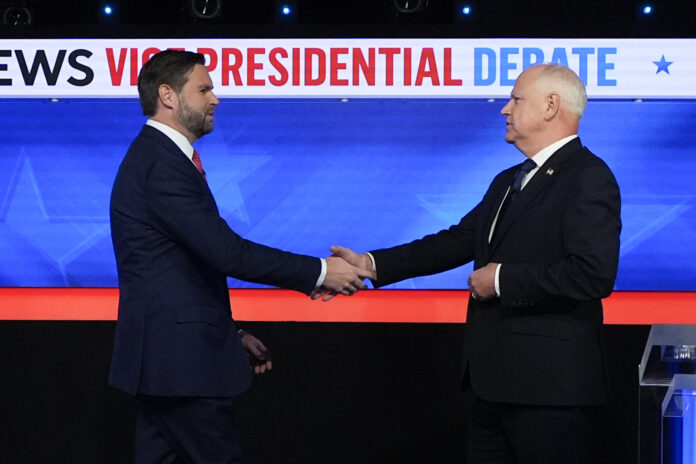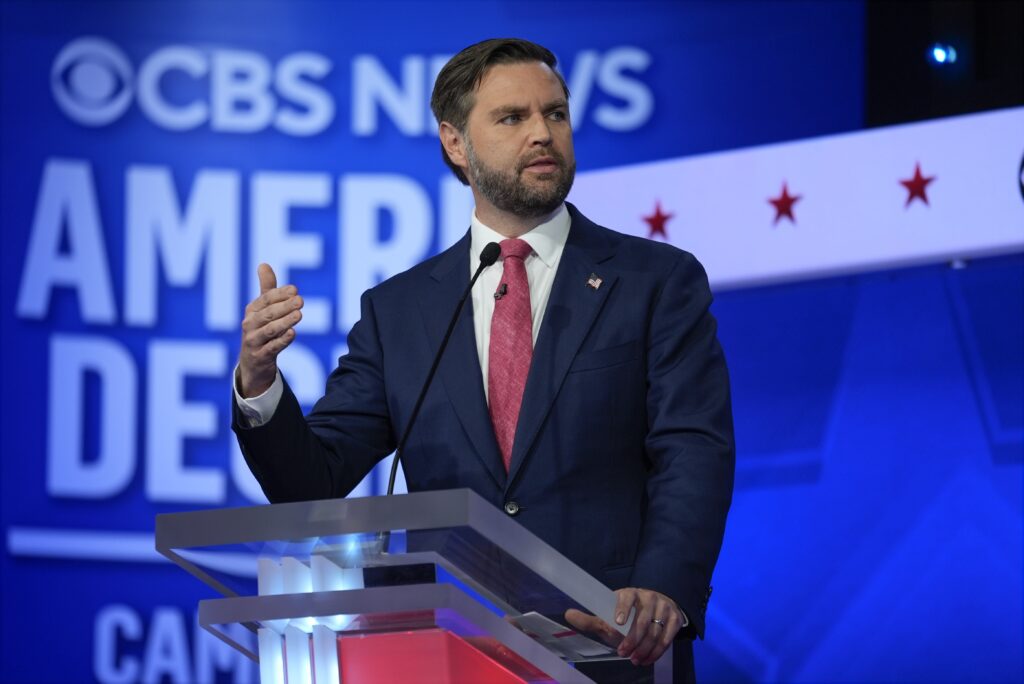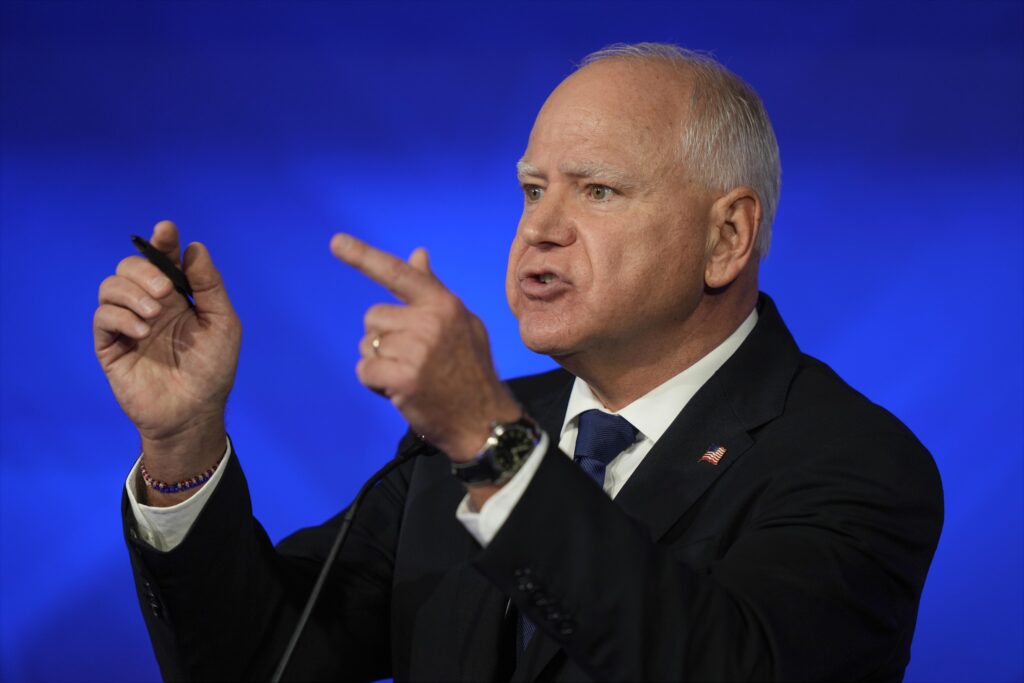
Civility returned to the American political debate stage on Oct. 1, angering pundits on both sides of the aisle. The 90-minute debate addressed current crises like the Middle East, the devastation wrought by Hurricane Helene and the longshoreman’s strike, as well as the top hot-button issues of the economy, immigration, gun control and abortion rights. However, topics such as racism, crime and LGBTQ+ rights were notably absent as Democratic Minnesota Gov. Tim Walz and Republican Ohio Sen. JD Vance presented their views, along with those of their respective running mates.
With few exceptions, the exchanges were respectful, measured and informative. Fact-checking post-debate showed Vance misrepresented facts repeatedly while Walz rarely did. What viewers saw were two candidates discussing the same issues, but with very different viewpoints—although the gentler, milder version of himself Vance presented at times sounded almost like a Democrat, like when he talked about family leave and childcare.
For his part, Walz presented as Mr. Bipartisan—a politician with 20+ years of working across the aisle in Congress and as a governor. It was in fact his conciliatory point of view that seemed to frustrate and even outrage MSNBC’s panel of pundits led by Rachel Maddow. MSNBC host Symone Sanders-Townsend, former spokesperson and a senior advisor for Vice President Kamala Harris, was most bothered by Walz’s presentation, asking where the firebrand of his rallies was.
Uniformly there was annoyance that Walz was a point man for himself, but mostly for Harris in his responses to questions by the moderators and in his exchanges with his opponent, Vance, rather than a feisty fighter yelling like he does at rallies.
With one exception, in which Vance fought with the moderators and his mic was cut and then so was Walz’s as he joined in the argument, it was a measured and respectful back-and-forth that meant viewers—and most notably those elusive Independents as well as the much-touted undecided voters—could actually hear what was being said by each side and judge accordingly.
Debates are not rallies. For a nation that claims exhaustion over the breadth of incivility, Donald Trump has brought into the public discourse, the tone of this debate and the way it wrapped, with the candidates shaking hands and inviting their wives up to be introduced was refreshingly normal.
Did that civility alter what was said? No — which should have presented a stark contrast for every viewer and voter, decided or undecided.
Moderation was the watchword
Sponsored by CBS News and moderated by nightly news anchor Norah O’Donnell and “Face the Nation” host Margaret Brennan, the rules were laid out clearly: two-minute answer times to moderators’ questions, two minutes rebuttal and a minute if requested for further comment at the moderators’ discretion. Mics would be cut the same way.
The debate began with a faulty Walz and a self-assured Vance. There had been low-expectations for Walz, who has a sketchy debate style and who himself has said he isn’t a good debater. But his prep team included Secretary of Transportation Pete Buttigieg in the role of Vance.
Buttigieg is the best interlocutor for the Biden administration outside of Harris herself and is known for his unflappable style. He clearly imparted that to Walz, who in previous settings has been easily triggered by opponents and gave some questionable responses in the joint interview he did with Harris and CNN’s Dana Bash.
After a shaky start, Walz found his groove, which was to consistently use his own executive experience in Congress and especially as governor to both highlight that he has such experience and thus is better equipped and more qualified for the vice-presidential position than the much younger Vance, who has only held office since he was elected in 2022.
For his part, Vance touted the talking points he and former president Donald Trump have been stating on the campaign trail: that the Trump presidency was good for America and benefited most Americans, while the Biden-Harris administration has been both damaging and dangerous for the country, but for middle-class people and workers most of all. “[Harris and Walz] make a lot of claims about if Donald Trump becomes president, all of these terrible consequences are going to ensue,” Vance said. “But in reality, Donald Trump was president. Inflation was low. Take-home pay was higher.”
Vance repeatedly, starting at the very beginning of the debate, referenced his personal origin story that he wrote about in his best-selling 2016 book “Hillbilly Elegy: A Memoir of a Family and Culture in Crisis,” discussing his mother’s addiction and the family’s reliance on government programs, including Medicaid and food stamps and the Social Security of his grandmother who largely raised him. Vance himself, like Walz, went to college on the G.I. Bill.
These stories were humanizing for Vance, who has presented on the campaign trail as an often vicious pit bull in his attacks. Vance has also been caught repeatedly in lies like his false narrative about Haitian immigrants eating pets and by previous misogynist comments about women, like his references to the Democrats being run by “childless cat ladies,” that have haunted him with memes, T-shirts and Taylor Swift’s sign-off on her endorsement of Harris-Walz that enrolled a half-million new voters.
Vance attempts a gentler approach

The debate was no different. While this softer presentation by Vance gave a sheen of likeability to the often unlikeable candidate, the fact-free statements came often and hard, resulting in that one flurry of discord with the moderators as he objected to being fact-checked about his lie about Haitian immigrants in Springfield, Ohio eating pets.
The spate of misinformation by Vance overshadowed the debate for those not in a Fox News bubble and perhaps made Walz’s regaling of facts that were indeed facts less appealing to those who wanted more of a floor-fight, like the last two presidential debates provided.
But what Walz did in the debate was detail how much Biden-Harris have done for the country and especially for the middle-class and workers and how Harris’s policy proposals for her presidency proffer a giant step forward for the country as a whole but the middle class and those facing housing and healthcare crises now.
Walz promotes Biden-Harris accomplishments
Walz also highlighted how the current administration has made America safer coming out of the pandemic, with healthcare overall but especially the broadening of the Affordable Care Act, which Trump has repeatedly tried to overturn. Walz also explained how Biden-Harris had reduced prices for drugs including insulin and their efforts to cope with the crisis of climate change and with the threats to women’s reproductive rights.
In each instance, Walz’s steady refutations of Vance and the Trump record and plans for the future, including Project 2025, provided a clear and defining contrast on the normalcy that Harris-Walz would bring to the country versus the dismantling of the safety net that by his own description, Vance’s troubled family relied on throughout his childhood.
Abortion rights
One such moment was during discussion of abortion rights in which Vance tried to both walk back the damage Trump did to abortion rights by facilitating the overturning of Roe v. Wade and claim Republicans want to help women who think abortion is the only option because like women he grew up with, they could not afford an unplanned pregnancy.
In that exchange, Vance asserted that “Democrats have taken a very radical pro-abortion stance.”
Walz rebutted, saying in part, “I’m going to respond on the pro-abortion piece of that. No, we’re not. We’re pro-women. We’re pro-freedom to make your own choice.”
Walz spoke of the often harrowing impact of abortion bans on women and girls seeking emergency care, like the tragic death of Amber Thurman, 28, who died of sepsis after she was unable to get treatment for an incomplete miscarriage, leaving a six-year-old son motherless. Vance said he was sorry for Thurman’s death, but his stance on abortion has been unwavering until the debate—and included his support for a national abortion ban.

Jan. 6
There was no more dramatic point in the night’s debate than when the moderators laid out the facts of Trump’s refusal to acknowledge that he lost the election. Point by point, O’Donnell explained how Trump had taken his case to scores of courts and been rejected. The election was won by Joe Biden.
And yet undoing all his careful presentation of the rational version of his running mate, Vance was unable to acknowledge Trump lost and that Jan. 6 was an attempt to overthrow the government.
Vance said, “It’s really rich for Democratic leaders to say that Donald Trump is a unique threat to democracy when he peacefully gave over power on Jan. 20.”
Then-Vice President Mike Pence told Fox News after the Jan. 6 attack on the Capitol, “President Trump demanded that I use my authority as vice president presiding over the count of the Electoral College to essentially overturn the election, by returning or literally rejecting votes. I had no authority to do that.”
He added, “The president specifically asked me — and his gaggle of crackpot lawyers asked me — to literally reject votes to which would have resulted in the issue being turned over to the House of Representatives, and literally, chaos would have ensued.”
Walz responded to Vance, saying, “This was a threat to our democracy in a way that we had not seen. And it manifested itself because of Donald Trump’s inability to say — he is still saying he didn’t lose the election. I would just ask that. Did he lose the 2020 election?”
Vance said, “Tim, I’m focused on the future. Did Kamala Harris censor Americans from speaking their mind in the wake of the 2020 COVID situation?”
Walz, visibly stunned, said, “That is a damning non answer….look, when Mike Pence made that decision to certify that election, that’s why Mike Pence isn’t on this stage.”
Wrapping up
In their final statements Walz invoked Maya Angelou’s classic line, “When someone shows you who they are, believe them” while Vance tied his family’s struggle to heat their home to Harris’s energy policies. It was a final clash that symbolized how very divergent these two men are on all that matters to the country.
They shook hands, introduced their wives to each other, and left it to voters to choose who won. The resounding answer was America: without screaming or personal attacks, Vance showed that he thinks better windows and doors will mitigate school shootings, that he forgot he supports a national abortion ban and wants to sunder healthcare for millions and that he’s a COVID denialist, a climate denialist and most damning of all, an election denialist. Walz highlighted all those points without ever making a disparaging remark about Vance.
The pundits, yet again, are wrong.
